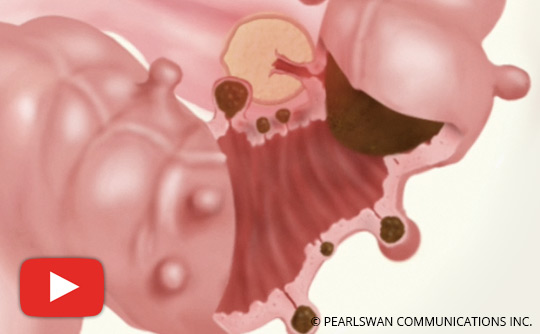What is Diverticulosis?
Diverticulosis is the formation of Diverticulum, or ‘pouches’ on the bowel. There are two causes: heredity and general wear and tear as we age. They grow as we age. Almost all Americans 80 years old will have formed them.
Why do diverticulum develop?
Diverticulosis does not form in areas of the world where high fiber diets are consumed.
They develop over years of ‘increased pressure’ within our large intestine. This pressure weakens the wall of the bowel, gradually pushing out ‘diverticulum’, or pouches. These pouches are thin, containing only part of the lining of the bowel. This leaves them more prone to ‘break’ or bleed.
What problems can diverticulum cause?
The overwhelming majority of us have no problems with diverticulosis. It is mild and causes no symptoms.
There are however, 3 problems that can develop:
- Perforation: The spillage of stool and bacteria into surrounding tissues creating infection. This is called Diverticulitis.
- Bleeding
- Chronic abdominal pain and irregularity
One ‘attack’ does not mean that you will have another.
Safety Tips:
- Develop an easy, effortless bowel movement.
- Call your family doctor immediately if symptom recur.
- Follow-up: You should schedule a colonoscopy and follow-up with your doctor if symptoms recur
| FOOD | SERVING SIZE | FIBER GRAMS / SERVING | CALORIES / SERVING |
|---|---|---|---|
| VEGETABLES | |||
| Artichoke | 1 globe | 6.0 | 60 |
| Asparagus | 1/2 cup | 2.0 | 25 |
| Beans: | |||
| - Green | 1/2 cup | 1.2 | 15 |
| - Kidney | 1/2 cup | 5.5 | 115 |
| - Lima | 1/2 cup | 6.0 | 85 |
| - Pinto | 1/2 cup | 7.5 | 120 |
| - White | 1/2 cup | 5.5 | 120 |
| Beets | 1/2 cup | 1.6 | 40 |
| Broccoli | 1/2 cup | 2.8 | 25 |
| Cabbage | 1/2 cup | 2.0 | 15 |
| Cabbage | 1/2 cup | 0.8 | 10 |
| Carrots | 1/2 cup | 2.5 | 35 |
| Cauliflower | 1/2 cup | 2.0 | 15 |
| Cauliflower | 1/2 cup | 1.2 | 12 |
| Celery | 1/2 cup | 1.0 | 10 |
| Corn | 1/2 cup | 2.0 | 65 |
| Cucumber | 1/2 cup | 0.4 | 7 |
| Eggplant | 1/2 cup | 1.2 | 12 |
| Green Peas | 1/2 cup | 4.5 | 60 |
| Lettuce | 1/2 cup | 0.4 | 5 |
| Onions | 1/2 cup | 1.5 | 30 |
| Potato | 1/2 cup | 1.5 | 65 |
| Spinach | 1/2 cup | 2.7 | 25 |
| Tomato | 1/2 cup | 1.0 | 20 |
| Zucchini | 1/2 cup | 1.2 | 15 |
| FRUITS | |||
| Apple | 1/2 cup | 4.0 | 80 |
| Apricots | 1 cup | 4.0 | 75 |
| Banana | 1 medium | 3.0 | 105 |
| Blackberries | 1 cup | 7.0 | 75 |
| Blueberries | 1 cup | 4.0 | 80 |
| Cantaloupe | 1 cup | 1.2 | 55 |
| Grapefruit | 1 medium | 3.0 | 80 |
| Grapes | 1 cup | 1.5 | 115 |
| Orange | 1 medium | 3.0 | 60 |
| Pear | 1 medium | 4.0 | 100 |
| Pineapple | 1 cup | 2.0 | 75 |
| Plums | 1 medium | 1.0 | 35 |
| Prunes | 1 cup | 11.5 | 375 |
| Raspberries | 1 cup | 8.5 | 60 |
| Strawberries | 1 cup | 3.5 | 45 |
| Watermelon | 1 slice | 1.0 | 50 |
| GRAIN PRODUCTS AND NUTS: | |||
| Breads: | |||
| - French | 1 slice | 1.0 | 70 |
| - Rye | 1 slice | 1.5 | 70 |
| - White | 1 slice | 0.5 | 70 |
| - Whole Wheat | 1 slice | 2.0 | 70 |
| Cereal: | |||
| - Bran | 1oz (28gm) | 10.0 | 70 |
| - Corn Flakes | 1oz (28gm) | 1.0 | 110 |
| - Oat Bran | 1oz (28gm) | 4.0 | 70 |
| - Oatmeal | 1oz (28gm) | 3.0 | 110 |
| - Shredded Wheat | 1oz (28gm) | 3.0 | 100 |
| Crackers: | |||
| - Graham | 1 square | 0.1 | 30 |
| - Saltine | 1 regular | 0.1 | 15 |
| Rice: | |||
| - Brown | 1/2 cup | 2.0 | 110 |
| - White | 1/2 cup | 0.5 | 100 |
| Spaghetti | 2 oz / (57gm) | 2.0 | 225 |
| Almonds | 1/2 cup | 6.5 | 350 |
| Peanuts | 1/2 cup | 6.0 | 390 |

